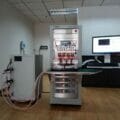Optical Surfaces Ltd has supplied a high precision beamsplitter that lies at the heart of a Michelson type interferometer for testing of optical components used in military applications.
The Defence Systems integrator awarded the contract to design and build the interferometer selected Optical Surfaces Ltd as their optical supply partner for this project because of their track record in producing complex, high precision optics.
Required for testing the quality of infrared optical components the Michelson type interferometer design was optimised for multi-wavelength operation in both the mid and far infrared.

Dr Aris Kouris, Sales Director at Optical Surfaces Ltd. commented “The beamsplitter is one of the most critical components of an interferometer as it divides a beam of light into two distinct paths and then recombines the two beams after introducing a difference in the two paths. Operating in a uniquely stable manufacturing environment our team of experienced optical craftsmen were able to produce an ultra-high precision finish (Lambda/20 p-v) on all surfaces of the beamsplitter. However, to produce the multi-wavelength operation required a big stack of dielectric coatings on the partially reflective side of the beamsplitter which caused the surface form to be distorted. To overcome this challenge – we quantified the amount of costing induced distortion and then applied the opposite amount of distortion when recoated to produce the required high performance optical form”.
Optical Surfaces Ltd is a leading supplier of single to OEM quantities of high precision, custom beamsplitters to spectroscopy, interferometry and imaging instrument manufacturers around the world. For further information on custom beamsplitters please visit https://www.optisurf.com/index.php/custom-beamsplitters/ or contact Optical Surfaces Ltd. on +44-208-668-6126 / sales@optisurf.com.
Optical Surfaces Ltd has been producing optical components and systems for astronomical and space research for more than 50 years. The company’s ISO 9001-2015 approved manufacturing workshops and test facilities are deep underground in a series of tunnels excavated in solid chalk where temperature remains constant and vibration is practically non-existent. With such stable conditions testing, particularly with long path lengths, becomes quantifiable and reliable








